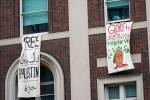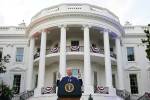Fear is our last, best hope — what else will make us act?
A man with a public radio show that features representatives of three generations -- seniors, baby boomers and younger -- asked me to represent baby boomers on the subject of fear.
Do I look that afraid? Are these fears that I thought I carried beneath the surface actually out there above it? Is life the headlight, and am I the deer?
Fear is a highly relevant subject, and it became ever more so as I pondered it from a generational standpoint in preparation for this program that would sit me between an oldster and a youngster.
Here is what I decided: Fear is bad if it paralyzes you, but good if it mobilizes you to confront and overcome that which scares you.
Perhaps that is far from profound. Perhaps it is merely the obvious belabored.
But it would be worth reconsideration, especially in the context of the nation's perilous fiscal and economic horizon.
An American baby boomer grew up fearing the Cold War and nuclear holocaust. As children we ducked under our desks. We huddled at recess in October 1962 and repeated our parents' worries that the world would end by nightfall.
So what did we do and how did that turn out? Motivated by fear, we kept pouring our resources into military might and technology to the point that the Soviet Union, needing to keep up without a naturally elastic and generally enriching economic system like ours, collapsed.
Then as American baby boomers entered their 40s and 50s and prepared to run the world, we were attacked by crazed forces seeking to ruin us simply by making us afraid -- of getting on an airplane or of traveling abroad or of people who look a certain way.
So how is that turning out? Motivated by fear, we have acquiesced to certain compromises in our unfettered liberties so that we might feel safer. Motivated by an awareness that the paralysis of fear is the very end our enemies seek, many of us have confronted that fear to behave the same, or nearly the same, as we behaved before.
We have not experienced another 9-11, knock wood, and we have failed to measure up only to the extent that -- from unconfronted fear -- we have become openly discriminatory of people of a certain appearance and religious belief whom we choose to stereotype.
Then, in 2008, as baby boomers beheld generously accumulating personal assets that had them thinking retirement, the economy pretty much collapsed from greed and from an explosion in a housing bubble that we always knew was there.
Forced to bail out and try to stimulate a failed private sector with borrowed federal money, we simultaneously beheld not only private economic peril, but the long-term insolvency of our government.
A recession is a reduction in economic activity. A recession is therefore largely, though not entirely, a matter of fear.
One key element in getting out of a recession is to confront that fear -- for a business to stop piling up dormant profits and start hiring and for citizens to stop sitting on their tax cuts and venturing to put them in self-multiplying circulation.
This tea party business about taking the country back? It's fear. It is misplaced in many specifics, but not in the general thrust, which is that we must confront the fiscal irresponsibility of our government.
Columnist Ruth Marcus of The Washington Post put it deftly last week. She explained that deficit and debt reduction is, among other things, about a 56-year-old man who loses his job and hasn't saved enough for his retirement and risks living with health conditions in his 70s after Social Security has been reduced and Medicare run completely into the ground.
Deer in the headlights, indeed. Baby boomer fear -- and the confronting thereof -- might be our last best hope.
John Brummett is an award-winning columnist for the Arkansas News Bureau in Little Rock and author of "High Wire," a book about Bill Clinton's first year as president. His e-mail address is jbrummett@ arkansasnews.com.























